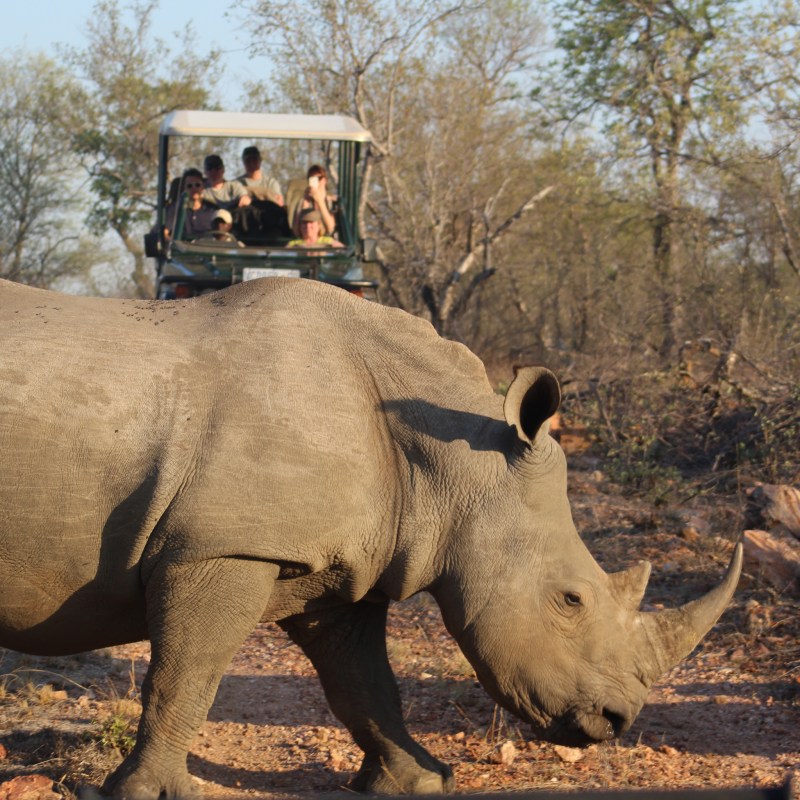
Heading down the dusty roads of Kruger National Park in far northeastern South Africa, our safari vehicle slowed to a halt as yet another herd of elephants began stomping across the road like giant wise guardians. Just minutes before, a pod of lanky giraffes caused our vehicle to stop for a while, and a wary group of water buffalo, with their meaty bodies and curling horns, watched us as we passed. Somewhere in the distance, a lion roared.
Videos by TravelAwaits
This is Kruger National Park, 7,580 miles of wild lands that are home to 500 bird species and 145 mammal species, including elephants, black and white rhinos, giraffes, zebras, antelopes, hippopotamuses, and lions. Located in the heart of the Lowveld, the entire park is a wildlife reserve and is bigger than the country of Israel. For many, Kruger National Park is a bucket-list destination, a glimpse of wild Africa.
Kruger National Park, originally known as the Sabi Game Reserve, was founded in 1898 by Paul Kruger, who wanted to protect the animals of the game reserve. On May 31, 1926, Kruger’s dream came true when the National Parks Act was passed. The Sabi Game Reserve and the neighboring Shingwedzi Game Reserve were combined to create Kruger National Park.
Today, roughly 950,000 people visit Kruger National Park every year, and the majority of the visitors — a whopping 80 percent — are South Africans. The park boasts more than 1,500 miles of all-weather roads that allow visitors to explore the park in their own vehicles, but safari guides are readily available as well.
Whether you decide to tour Kruger on your own or sign up for a safari, we have everything you need to know to get the most out of your visit to this important, awe-inspiring, and massive park.

When To Go To Kruger National Park
The dry winter months between May and September are generally the best times of year to visit Kruger National Park because the bush thins out a bit, making the animals easier to spot. September is a popular month, since the night and morning are less chilly.
The wet season between October and April has its advantages, however. The land turns green and lush, and many of the animals start having babies. Migratory birds are also plentiful around this time of year, but the days can be muggy and humid. The bugs are also out in force, so this is the time to take antimalarial medication, just in case.

How To Get To Kruger National Park
Flying into South Africa is by far the easiest way for international tourists to visit the park. There are four airports that serve the park: the Hendrik Van Eck Airport in Phalaborwa in northern Kruger, Hoedspruit Airport in the central region, the newly opened Skukuza Airport, and the Kruger Mpumalanga International Airport in the southern area.
That being said, most international visitors fly into the Johannesburg O.R. Tambo International Airport, where daily flights are offered between Johannesburg and many of the regional airstrips surrounding Kruger. The flights take about 90 minutes and can drop you off at the airstrip in the park closest to the lodge where you are staying.
Daily flights also operate to Skukuza from Cape Town. The Kruger Mpumalanga International Airport also operates daily flights from Durban and Cape Town, and another flight is available from Cape Town to Hoedspruit. Many of the lodges offer transport to and from the regional airports.
You can also rent a car and drive from Johannesburg to Kruger National Park, especially if you plan to take a self-guided tour of the park. The drive is approximately 5 to 7 hours, but it will give you the freedom to stop at other attractions along the way.

Where To Stay In Kruger National Park
Where you decide to stay depends on what kind of Kruger experience you want.
Kruger National Park has camp-run accommodations, and each camp has its own unique offerings, ranging from basic camping to the quintessential safari tents to luxury lodges. Kruger has 10 luxury safari lodges you can book, and the surrounding private game reserves offer luxury accommodations, meals, and highly trained personnel. The private lodges include Londolozi Founders Camp, Mala Mala Main Camp, Londolozi Varty Camp, and Sabi Sabi Bush Lodge. You may also consider the newly built Skukuza Safari Lodge in Kruger.
The average length of stay for a safari in Kruger is a minimum of two nights up to a week. If you plan to stay for more than four days, consider choosing two separate lodges so that you can enjoy a nice variety of experiences, animals, and foods.
Pro Tip: If you do opt for a private game reserve, know that these reserves are not fenced off from predators. Lions, leopards, elephants, giraffes, and zebras can wander through the camp, so exercise extreme caution and never walk around unaccompanied after dark.

Should I Explore The Park On My Own Or Take A Guided Safari?
When I visited Kruger National Park, the group I was traveling with opted for a self-guided tour of the game reserve. Luckily, our driver was well versed in how to spot animals in the park, but having a true safari experience is worth the cost and consideration as well.
If you opt for a game drive, you’ll have plenty of options to choose from. Morning drives, sunset drives, and even nighttime drives can be booked at the park, and an experienced and knowledgeable guide will point out wildlife and information you likely wouldn’t notice on your own. Most lodges and private lodges offer their own driving and walking safaris as well.
If you choose to explore the park on your own, maps will be your best friend. A great list of maps can be found here.
If you want the best of both worlds, Kruger offers a Park & Ride program. Just park at a select gate and hop on a safari ride through the park to see the Big Five and more.
Pro Tip: Kruger also offers safari adventures for the disabled.

How To Prepare For A Safari Bush Drive
You wake up in your safari tent or in your luxury lodge room excited for the day and the chance to see the famous wildlife of Africa. The golden hours of safari are typically the early morning, sunset, and nighttime, so try to book your drives during those hours, when the animals are more active.
To have a good Kruger experience, plan to bring items like binoculars, insect repellent, a camera, a map, plenty of bottled water and snacks, and a hat and sunscreen to protect against the African sun. You’ll also want to pack a couple of light T-shirts, a few long-sleeved shirts for the chilly nights, a rain jacket if you’re visiting during the rainy season, good walking shoes, shorts and long pants, and a hat.
Avoid wearing white, which makes you very visible to the animals. Red attracts some animals, and bright blue can attract biting flies. Stick with neutral colors like sand, brown, and muted green.
Remember, you are in the wild. Never approach wild animals, and do not get out of your vehicle unless you are in a designated “hide” area. Every year, there are fatalities because a careless tourist got out of their vehicle to take a closer look at an elephant or lion. Also, keep your windows up when possible. Baboons can be pretty aggressive about snatching food out of vehicles.
Don’t swim in the rivers and lakes in Kruger. Hippos are the most dangerous of all the big animals, are very territorial, and run faster than humans do. Crocodiles can also ruin your day if you get too close.
Always listen to your guide, if you have one. If they say not to run, then don’t run. If they say to move away, then move away. Your guide’s job is to keep you safe in one of the world’s last true wildernesses, so trust that they know what is best for you.
Pro Tip: Your guides and spotters work hard, so expect to tip each of them anywhere from 50 to 150 rands per day. If you have the same guide each day, err on the side of tipping well. If you don’t know how much to tip the guides or staff, ask the tour operator or the concierge at your lodge. While most tips are in the South African rand, American dollars are appreciated as well.

Medical Tips And Advice
No one wants to get sick or injured while on an epic safari, but if something does happen, South Africa has plenty of clinics, hospitals, and medical personnel. That being said, you should have medical insurance or travel medical insurance. If you do an internet search for “travel medical insurance,” you’ll find plenty of affordable options.
While South Africa is mostly malaria free, Kruger National Park does have some areas where the malarial mosquito is found. Antimalarial drugs are available at pharmacies in South Africa and by prescription from your doctor.
The water is safe to drink in South Africa and at Kruger National Park, and many of the lodges and hotels provide bottled water as well.
Be aware that HIV is still a concern in Africa, so avoid contact with bodily fluids and do not have unprotected sex.

Other Activities In Kruger National Park
Kruger National Park isn’t just about game drives and safari walks.
Golfing enthusiasts will be thrilled with the Skukuza Golf Course, which was built in 1972. The course is designed for golfers of all levels, but again, you may have a few run-ins with the local wildlife, since the golf course isn’t fenced in.
Mountain biking, group backpacking with a trail leader, and birding are also popular activities at Kruger National Park. The 4×4 Adventure Trails, which get you off the beaten track to areas of park that are rarely seen, are also worth checking out.
Many of the luxury lodges offer spa experiences as well as swimming pools, chef-inspired meals, full bars, and all the bells and whistles. You will not get bored — trust me!
And speaking of meals, a bush braai is a not-to-be-missed experience. A braai (barbecue) around the boma (outdoor enclosure with a fireplace) is available at most of the camps in Kruger, and it usually includes a choice of three grilled meats, salads, breads, drinks, and desserts. If you book a night game drive, you can also book a braai in the middle of the Kruger bush under the night sky. Available at all rest camps, this 3-hour experience requires booking in advance.
Pro Tip: Bring a good book or two. During the high heat of the day, when the animals are hunkered down and being lazy, you’ll want to take advantage of the down time to relax, read under some shade, and just appreciate the experience of being in Africa.
